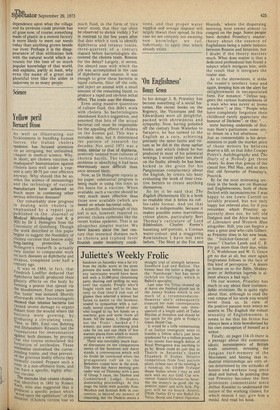'On Englishness'
Benny Green
In his dotage J. B. Priestley has become something of a social historian. His recent books on the Regency, the Victorians and the Edwardians were all delightful, packed with shrewdness and sympathy. Now, having polished off the century from Waterloo to Sarajevo, he has turned to the English as a race, achieving precisely the same faults and virtues as he did in the three earlier books, and which indeed he has produced in most of his polemical writings. I would rather not dwell on the faults; already he has been kicked in the groin for his Panglossian complacency about the English, by critics too busy evaluating the work of their creative betters to create anything themselves.
So let it be said that The English (Heinemann E5) is a book so readable that it belies its coffee-table format. And yet that format is indispensable, because it makes possible some marvellous colour plates, particularly Bert Thomas's caricature of Lord Ribblesdale, Charles Keene's haunting self-portrait, a Cotman water-colour, and a staggering Rowlandson I have not seen before, 'The Meet at the Fox and
Hounds,' where the dispersing morning mist seems almost to congeal on the page. Some people have derided Priestley's mastertheory about the essence of Englishness being a subtle balance between Reason and Intuition, but I doubt if the theory matters much. What does matter is that a dedicated professional has found a subject which intrigues him, with the result that it intrigues the reader also.
As to the shrewdness, it stabs the reader's intellect time and again, keeping him on the alert for enlightenment in encapsulated form. For instance: "Delius suggests the curious homesickness of a man who was never at home anywhere "; or this: "People who have completely forgotten their childhood rarely appreciate the humour of Dickens"; or this: ". • . some burning underside of Holman Hunt's puritanism, some erotic dream on a hot afternoon...." Just as commendable is his determination to push the market price of those writers he believes deserve a lift, so that John Cowper Powys's Autobiography and The Diary of a Nobody get three cheers. So does that genius of the casual line, Phil May, and so does that old favourite of Priestley's, Peacock.
By far the most interesting sections in the book are on Humour and Englishwomen, both of them flecked with inconsistencies. I was happy to see Lewis Carroll so lavishly praised, but not only happy but relieved also, for if you remember, which Priestley apparently does not, he left old Dodgson and the Alice books out of Literature and Western Man altogether. Still, you can forgive a man a great deal who calls Gilbert, as Priestley does in his new book, the "Solicitor-General of nonsense." Charles Lamb and C. B. Fry get more than their due, while P. G. Wodehouse and W. G. Grace get no due at all, but once again forgiveness follows in the face of this kind of perception: "A desire to fasten on to the Bible, Shakespeare or Arthurian legends is almost always a bad sign."
On our women, Priestley has much to say about their commendable eroticism. He is quite right about that, although to read the vast corpus of his work you would never think so. In view of the positive passion with wmcn ne
asserts in The English the robust
sexuality of Englishwomen, it seems to me that his fiction has always been a little bowdlerised by his own conception of himself as a writer.
Finally, on pages 114-15 there is a passage about the sometimes
idiotic intransigence of British trade unionists, stressing the Jungian race-memory of the Movement and hinting that in dustrial relationships are very of ten determined by the attitudes of bosses and workers long since dead and buried. In pointing that out Priestley becomes the first prominent commentator since Arthur Koestler to understand the nature of the working classes, for which reason I say, give him a medal. And read his book.










































 Previous page
Previous page